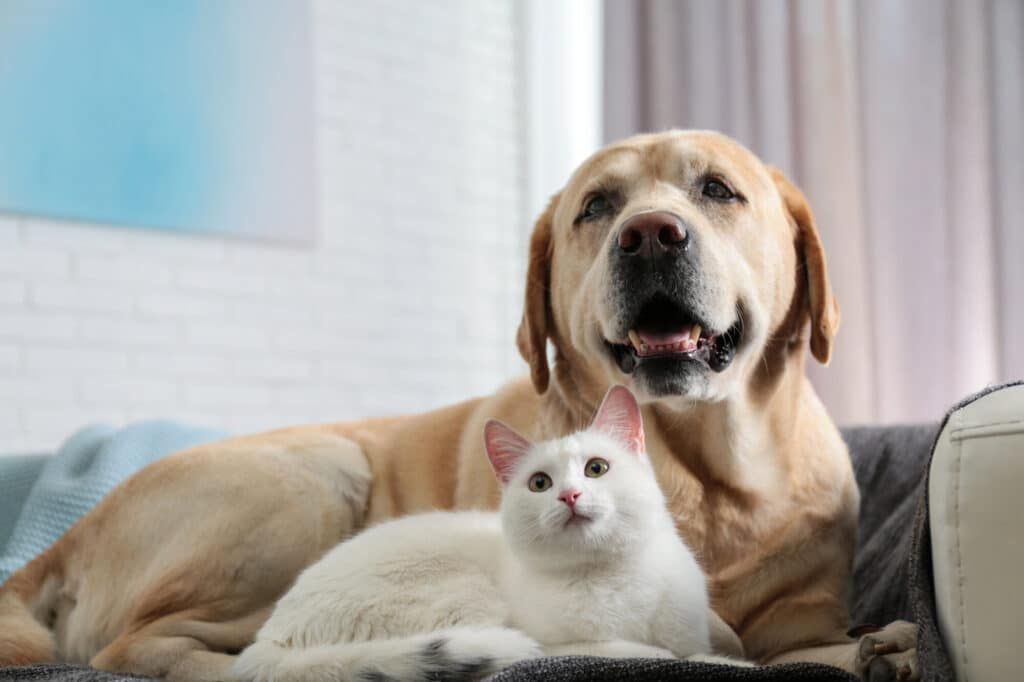What’s The Best Pet Insurance in Wisconsin?
After extensive research and data analysis, we named the following providers as the best pet insurers in Wisconsin.
The Best Pet Insurance Companies in Wisconsin in Detail
After conducting extensive research, we identified Lemonade as our top pick for the best pet insurance provider in Wisconsin.
Compare Pet Insurance Companies in Wisconsin
Comparing providers using our tool below can help you quickly identify plans with the features most important to you.
How Much Does Pet Insurance Cost in Wisconsin?
Our research found that the average cost of a pet insurance plan in the Badger State is $55 per month for dogs and $28 for cats. However, the actual costs you pay for a plan will depend on your pet’s age, species, breed and where you live. Purebred pets prone to hereditary issues are generally more costly to insure, for example.
We calculated this average by gathering quotes from 22 pet insurance providers using ten different sample pet profiles. Sample pet profiles include mixed-breed and purebred dogs and cats, ranging from 3 months old to 8 years old.
The table below shows monthly plan costs in Wisconsin by species and provider.
| Provider | Dog Insurance | Cat Insurance | Overall Average |
|---|---|---|---|
| Lemonade | $33 | $44 | |
| ASPCA | $39 | $18 | $29 |
| Spot | $52 | $24 | $39 |
| Embrace | $59 | $31 | $47 |
| Fetch | $54 | $29 | $44 |
| Figo | $22 | $12 | $18 |
| Healthy Paws | $52 | $20 | $37 |
Cheapest Pet Insurance in Wisconsin
Figo and Pets Best offer the cheapest pet insurance plans in Wisconsin, based on our cost research.
Our team collected quotes for 22 pet insurance companies in Wisconsin. We ranked Wisconsin’s five most affordable companies in the table below. Note that the cheapest providers may not have appeared in our top-ranked options in the state due to a lack of adequate coverage and availability, high deductibles or low annual limits.
| Compary | Cost |
|---|---|
| Figo | $18 |
| Pets Best | $28 |
| ASPCA | $29 |
| Healthy Paws | $37 |
| Spot | $39 |
How To Choose the Best Pet Insurance in Wisconsin
Consider the following when picking your pet insurance coverage:
- Coverage and plan types: Coverage varies by plan type, which ranges from minimal accident-only insurance to more comprehensive accident and illness coverage. Most providers also offer wellness plans to help cover the cost of routine expenses, including vaccines, spay and neuter procedures, and dental care.
- Fine print: A pet insurance policy’s fine print often includes a list of exclusions and detailed expectations relating to the claims process. Reading a sample policy before purchasing your plan can give you valuable details about your coverage, including what is and is not covered.
- Customization: Many plans allow you to adjust your deductible, reimbursement rate and coverage limit to find the right balance between cost and coverage. Customization makes it easier to manage plan costs as your pet ages and its health needs change.
- Customer satisfaction: To determine how people who have purchased a plan truly feel about it, you can check reputable review sites, such as TrustPilot, to read reviews and first-person accounts.
State pet insurance laws can dictate how providers operate and the availability of certain plans in your area. It is best to obtain quotes from your preferred providers early in the quote process to ensure you are not investing too much time and energy into a plan that does not operate where you live.
Pet Laws in Wisconsin
Wisconsin has pet laws regulating pet licensing, animal cruelty, hunting dogs, and other policies that allow pets and people to live safely together. Wisconsinites must follow state laws in addition to town and county laws. Here are a few examples:
Milwaukee Pet Laws
- Pet owners may keep a maximum of four combined dogs, cats or rabbits.
- Kennels, pet shops and grooming salons must prominently display a city license.
- Residents must license dogs and cats older than five months with the city.
Madison Pet Laws
- Pets are not allowed at outdoor city events with 10 or more food vendors.
- Dogs and cats must be leashed when off the owner’s property or otherwise considered to be running at large.
- Collars with identification tags are required for all dogs older than 5 months.
Green Bay Pet Laws
- No more than two dogs or three cats are allowed per residence without an excess animal permit.
- Pet shop lemon laws allow residents to seek reimbursement for veterinary care costs if a new pet gets sick within seven days of purchase.
- Residents must register breeding dogs as such with the city.
Is Pet Insurance Worth It in Wisconsin?
Unexpected or ongoing veterinary bills can force pet owners into making tough financial decisions about their pet’s care. Pet insurance offers a solution to this dilemma, providing a financial safety net if your pet gets sick or injured. The cost of a single emergency visit or orthopedic surgery can easily exceed a lifetime policy cost.
Lemonade, Spot and Embrace are our top picks for insurance providers in Wisconsin. We recommend obtaining quotes from at least three providers before making a final decision to ensure you’re getting the best coverage possible at a good rate.
Frequently Asked Questions About Pet Insurance in Wisconsin
Do pet insurance plans in Wisconsin cover wellness care?
Pet insurance is designed to cover unexpected veterinary expenses relating to accidents and illnesses. Similar to car insurance, which covers damage from an accident but not routine maintenance, pet insurance does not cover routine veterinary care. However, some Wisconsin providers offer wellness plan add-ons to partially reimburse routine care costs.
What is the best pet insurance for large dogs in Wisconsin?
Lemonade is our top overall pick for pet insurance in Wisconsin. However, if you are concerned about your large breed dog suffering from orthopedic problems such as hip dysplasia, we recommend choosing a plan with short orthopedic waiting periods, such as Spot.
What is the most common claim for pet insurance in Wisconsin?
The company’s top five most common claims include skin conditions, pain, stomach upset, seizures and knee ligament injuries, according to Healthy Paws.
What is the pet limit in Wisconsin?
The pet limit in Wisconsin is three dogs per home. There is no limit on the number of cats a person can have in the state.
How We Ranked the Best Pet Insurance Providers in Wisconsin
We gave Wisconsin pet insurance providers a star rating based on our objective scoring system, which accounts for pricing, coverage, customer experience, industry reputation, covered treatments and more. To rank providers, we surveyed local pet owners and chose plans that best fit their preferences and pet health needs. We also factored plan and provider availability in Wisconsin into our rankings.
Dog cost data was determined by averaging quotes from providers for a 3-month-old mixed-breed puppy, a 1-year-old medium mixed-breed dog, a 2-year-old golden retriever, a 5-year-old medium mixed-breed dog and an 8-year-old small-mixed-breed dog.
We determined cost data for cats by averaging sample quotes for a 3-month-old kitten, a 1-year-old shorthair cat, a 2-year-old Siamese cat, a 5-year-old mixed-breed cat and an 8-year-old domestic shorthair cat.
For more information about cost collection or ranking procedures, check out our full pet insurance methodology and editorial guidelines.





